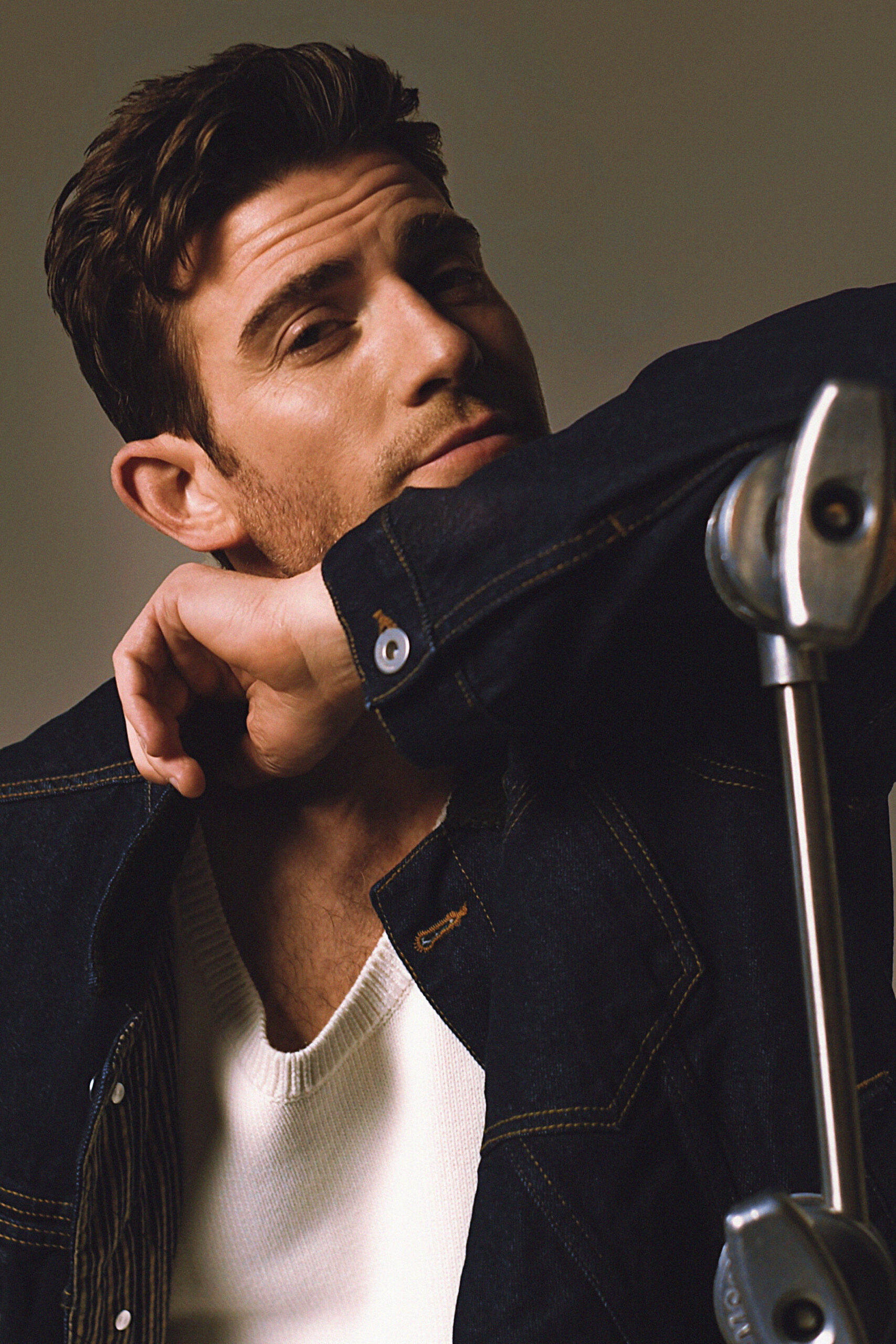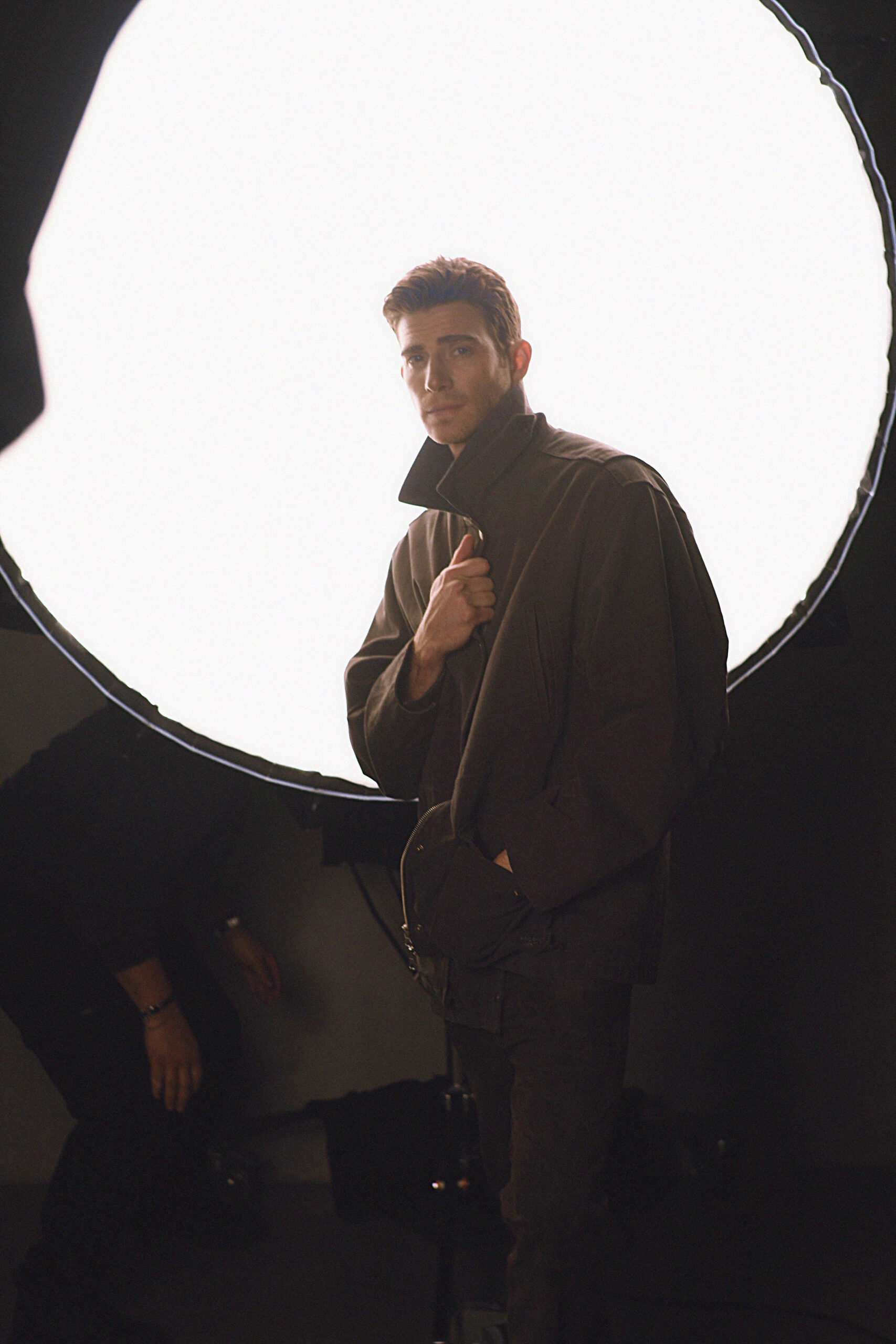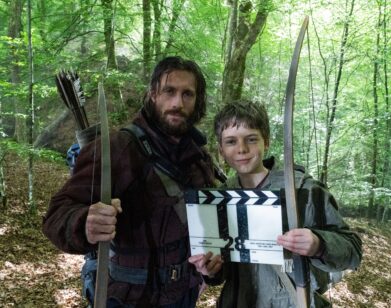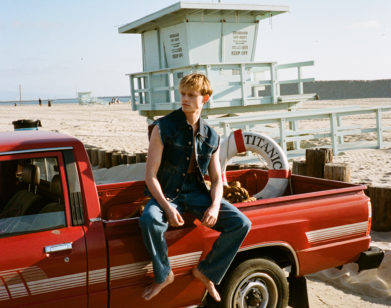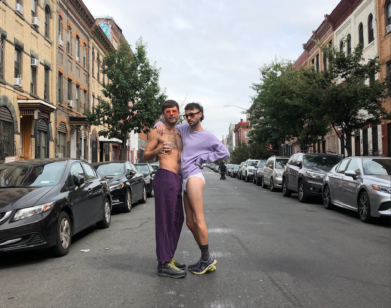HUNKS
“There’s Nothing That Can Stop Me, Man”: Bryan Greenberg, in Conversation with Chris Evans
After a series of devastating wildfires swept through Los Angeles this past winter, many found themselves rebuilding their lives from the ground up. For the actor Bryan Greenberg, who lost his home, the tragedy marked a personal reset, one that forced him to reassess everything from his relationship with the city to the direction of his career. “It’s easy to think that you know it all because you’ve been doing it,” he told his longtime friend and The Perfect Score co-star Chris Evans. “It’s about staying curious, always trying to learn, trying to surprise yourself constantly.” That new perspective is something Greenberg carried with him into his new role on Suits LA, the buzzy NBC spinoff of the beloved series Suits. Last month, on a Zoom with Evans, Greenberg reflected on fatherhood, career pivots, and how he’s managed to stay grounded in an industry that’s constantly shifting.
———
BRYAN GREENBERG: Yo.
CHRIS EVANS: Yo. What up, man.
GREENBERG: How are you?
EVANS: I’m good, brother. I’m in Australia right now visiting the wife. How are you? You in L.A?
GREENBERG: I’m in L.A. So you’re just hanging out down there in Sydney?
EVANS: Yeah. It’s actually great, dude. It’s beautiful. It’s summer out here. I’m literally looking at just the ocean right now.
GREENBERG: Your tan is amazing. But we miss you out here in L.A., bro.
EVANS: I know, man. I know.
GREENBERG: We’ve been holding it down without you.
EVANS: Good, man. How’s your house? I mean, your place by the–
GREENBERG: That house is gone. And that’s fine, man. We’re just dealing with insurance and all that fun stuff. I’ve kind of compartmentalized it as a thing in the background that I’m going to be dealing with for a couple of years and I’ve taken the emotion out of it. So we’re still in the crib in the hills. It’s great because I work at Universal, so it’s like two minutes from the house.
EVANS: You say that was the beauty of this gig from the jump, that you just could walk to work.
GREENBERG: That was not from the jump, though. We shot the pilot in Vancouver.
EVANS: Oh, right, right, right.
GREENBERG: I was looking for apartments in Vancouver. I thought I was going to have to do the “fly home every weekend, pull out my passport, I’m applying for the NEXUS pass…” All that stuff. And then the showrunner called me and said, “We got the tax credit.” I didn’t even think it was a possibility and I was like, “Oh my god. Wow, thank you.” Because I’ve been hustling, dude, for the last couple of years.
EVANS: Sure, man. And then this is such a blessing, not just because it’s a cool job, but because it actually shoots in L.A. Remember when things actually used to get shot in Hollywood?
GREENBERG: I know.
EVANS: It’s a blessing if they happen there every now and then.
GREENBERG: Yeah. Everybody last year was like, “Survived in ’25”. And now it’s ’25 and then the fires happened and you’d think there’d be work for people, but a lot of our friends are consistently not working. There’s just not a lot of opportunities out there. It’s kind of crazy. So I’m very grateful to be on a show that’s in L.A. that represents the city when the city needs it, putting people to work.
EVANS: Well, this brings us to the first question, man. What drew you to the project of Suits LA, and were you a fan of the original Suits?
GREENBERG: So I can’t lie and say I was a fan. I didn’t watch it, but I knew that it was a big hit. So when the script came my way I was like, “This is really fun. This is really good.” And everybody was trying to get on this wave because it just popped off on Netflix. But I was in such a zone with my movie Junction and promoting that. Then I was working on something else, so I was just in the flow and I couldn’t be stopped.
EVANS: Hey listen, you’ve just got to let go and see what happens and it’ll come to you.
GREENBERG: Yeah, man. Then I got it, and I watched the pilot just to get the tone of it. And you know me, dude. I love comedy, but I also love drama. And this really does that tricky balance that was just hard to pull off. It’s hard to do both and to do it well, but I mean, Aaron [Korsh], the showrunners obviously figured out the formula.
EVANS: Is it intimidating to join a spin-off of such a beloved show?
GREENBERG: It would be if it was my first thing, like it was The Perfect Score. If The Perfect Score was this franchise that we were going into, I would’ve been shitting myself. But at this point, my house just got burned down, and I feel there’s nothing that can stop me, man.
EVANS: You got perspective.
GREENBERG: Yeah, dude, I got kids now. It’s not that it doesn’t faze me, but you know how it is as you get older. It’s just like, the lows don’t seem as low because you know the highs are coming and you start to recognize the patterns, so you don’t get too down.
EVANS: That’s really well-put. Well, you mentioned having kids. Has your experience as a father changed your perspective in Hollywood, just the industry or even just projects you choose, things like that?
GREENBERG: A hundred percent. Well, first of all, I think it’s just made me a better actor because I have so much more depth and it’s just grounded me. But also, if the business is paramount in your life, then people sense that, you know what I mean? They sense if you’re desperate, they sense if you’re trying too hard. I’ll be honest, I probably did that for a couple of years where I was just trying too hard. It’s just about letting go and being present, as you know. We’ve talked many times about staying present and being in the moment, and it’s one of the things I love about you, man. You always keep it steady and you’re here, right now. I learn a lot from that and I feel like kids have really grounded me in that sense. It’s like, this is really what’s important. The acting stuff will come and go, but my family’s forever. And as far as taking jobs, ever since they were born, I’ve been working nonstop. I went off to film my movie Junction six months after they’re born.
EVANS: Six months. Where’d you shoot that?
GREENBERG: In Providence, Rhode Island.
EVANS: In six months. That’s incredible.
GREENBERG: It was tough. It’s incredible that Jamie [Chung] let me do that.
EVANS: And that was your first directing–
GREENBERG: Yeah. Well, you know how that is. It’s just so hard to act and direct.
EVANS: The prep, the post. Your brain never stops working.
GREENBERG: Yeah, I was in overdrive. And then I’ve just been kind of on this upswing. They always say the universe provides, like babies bring blessings, and as soon as I start having kids, I’ve been working.
EVANS: That’s great, man. What’s your favorite kind of legal drama? Because you’re dipping into a world of some really celebrated, successful shows in this category.
GREENBERG: Oh, that’s a good question. The Verdict, Paul Newman.
EVANS: Yeah. Oh, come on.
GREENBERG: Probably one of my favorites. He’s such a great anti-hero. He’s like a drunk who’s down on his luck and ha been kind of kicked around and it’s his own fault. He’s got one last chance to make it right. But 12 Angry Men, Sidney Lumet.
EVANS: Yeah, sure.
GREENBERG: A Few Good Men?
EVANS: Yeah. We just watched that the other night. I mean, Tom [Cruise] and Jack [Nicholson]. What a duo in that movie. So good.
GREENBERG: What about you?
EVANS: I was going to say A Few Good Men. It’s so good, such tight dialogue, such good room for back and forth, highs and lows. I mean, that’s tough to beat. Do you have a lot of scenes like that in this? Are you going to have a courtroom?
GREENBERG: Honestly, my stuff is way more comedic. I am sort of a utility player. There’s the drama, which I sort of get into, but they’ve really been leaning into the comedy for my character, which I love. Because I think the show needs it. I think it needs levity.
EVANS: Oh, you need it and you’re great at that. You got that in spades. What kind of other characters, if any, did you pull from to play Rick Dodsen? What a good character name.
GREENBERG: Do I look like a “Rick”?
EVANS: Listen man, you can pull off anything. What’s your relationship to L.A? You’ve been in the city, what, over 20 years?
GREENBERG: It’s crazy. I think we bonded on this because it’s a love-hate, you know.
EVANS: True, it is.
GREENBERG: I grew up in the Midwest, but then I moved to New York and I was like, “This is my place.” And still, in my heart, I feel like that’s my place.
EVANS: Yeah, you’re a New York guy to me. You’re almost too cool for L.A.
GREENBERG: I love it. New York is my heart. They’ll always be number one. And I’ve had a love-hate relationship with L.A. Even if you’re killing it in this town, you feel like you’re not enough. You know what I mean? You feel insufficient. And that’s on me, that’s not on L.A. I get anxiety when I’m here because it was always about the work and I’m like, “I live this for a living. I don’t need to be around it all the time.”
EVANS: It’s a one industry town, isn’t it? Everyone is somehow associated with it. Whereas in New York, you go out to a dinner party and you’re going to meet an architect and a doctor.
GREENBERG: But also, it wasn’t until I had the kids three-and-a-half years ago, I mean, you showed up one night–you’re there burping the baby. And that made me realize I do have roots here, and it really made me appreciate this town. And in the fires too, man, seeing how everybody rallied together and how many people stepped up for us, you included. It’s a great city if you let it be, if you don’t fight it.
EVANS: That’s the truth about L.A., isn’t it? You can carve out what you want it to be if you try. You’ve got kids now, but you also talked about how L.A. is full of those highs and lows and it’s easy to get caught up in it. But you seem more centered and present than ever. What lessons do you think you’ve been applying the most?
GREENBERG: I think a lot of it is trust. You do the work and then you let it go. You work on the script and you make your choices, but you don’t adhere to them. You just have them ready on demand and then you’ve got to be present and in the moment and let it go. You might get this job, you might not get this job, but having the inner confidence to be like, “I’ve been through this before. I will work again.” It’s just calmed me down a lot. I think we’re veterans at this point, right? How long have we been doing this?
EVANS: Too long.
GREENBERG: What year was The Perfect Score?
EVANS: 2002, I think. Long time, man.
GREENBERG: But it’s easy to think that you know it all too because you’ve been doing it. Like I said, it’s about staying curious, always trying to learn, trying to surprise yourself constantly.
EVANS: That’s the thing about this industry. No one can explain it. It’s all a firewalk. It can only be learned through experience. There’s a great line in The Matrix. “There’s a difference between knowing the path and walking the path.” Meaning someone can tell you all of these lessons, they can explain the keys to L.A., but it’s never going to resonate until you experience it and you’ve got to do the firewalk. You’ve got to get those scars and let them heal and learn from them. So it breaks some people, but you really feel like you’ve walked through it.
GREENBERG: Where are you at with it right now? I know you distance yourself, then you come back to it. How are you feeling about it?
EVANS: I was just telling my wife this the other day that L.A, the industry, is this bubble, this little cycle that’s just, “Book a job, prep for a job, do the job, wait for the job to come out.” If these are all the stages, the booking and the prepping is the most fun because it’s all potential. You see it as the best possible outcome. Then doing the job is a daily grind of realizing that you’re actually terrible and you don’t know what you’re doing and you have regret and uncertainty. And then waiting for it to come out is just the worst because you realize that this might’ve all been a miss and it’s full of regret and ego and neuroses, and then you start the process all over again. So it’s really this small bubble of hope that keeps you back and, I don’t know, we’ve been doing it a long time. My interests are starting to drift a little bit.
GREENBERG: Well, you’re also in a good spot where you can pick and choose. I told you this when I saw you on Broadway, bro. I always knew from the minute I met you at a screen test for The Perfect Score. I knew right away I was like, “Yo, this guy’s got it.”
EVANS: Well, here’s my last question for you. Are there any types of projects that you’re still dying to be a part of that you haven’t yet? What’s your bucket list? Is there a type of movie, a director, a role?
GREENBERG: It’s interesting. I like the consistency of being on television. I like that work. It’s like having a career where I’ve been the cool guy for a minute and then I wasn’t. I’ve gone through it and I’ve realized, as much as I love making these artistic choices, like I made Junction, that’s a movie about the opioid crisis. Nobody wanted to make that movie. You know what I mean? So I did the things I wanted to do, and it was awesome. But then you have family and it’s like, “being cool doesn’t pay the mortgage,” you know what I’m saying? So I do like the consistency and I think with Suits, I’m actually creatively satisfied with this job. I think it’s the best version of a network show you can do. I get to do all the fun, cool stuff, dramatic and sexy and fun stuff. But I’ve got a couple of things on my bucket list. I don’t think I’ve worked with a true auteur, a real visionary. Do you think you have?
EVANS: Yeah, I mean, I got to work with Director Bong [Joon Ho] and Danny Boyle. I’ve had a few that I’m kind of like, “Man, I don’t know if I belong here,” but it’s certainly a different experience on something like that in the few times I’ve done it.
GREENBERG: But I like the idea of just trusting somebody implicitly and just going with their vision. Because I feel like with Hollywood, everything gets so noted and watered down and it’s like groupthink; they’re doing surveys, screenings and then changing the endings, and I’m just like, “I want to work with someone who has a strong point of view and a vision, and I’m just going to get behind that.” There’s been a few I’ve worked with, like [George] Clooney, who was very strong-willed and he had a vision, and Ben Younger also on Prime, but I don’t know. There’s [Paul Thomas] Anderson, Quentin [Tarantino], [Martin] Scorsese. I’d love to work with these guys. Just real masters of their craft.
EVANS: Yeah, [they’re] tough to beat.

